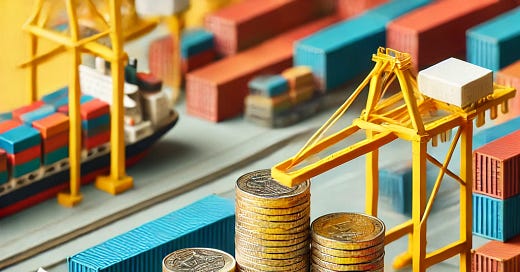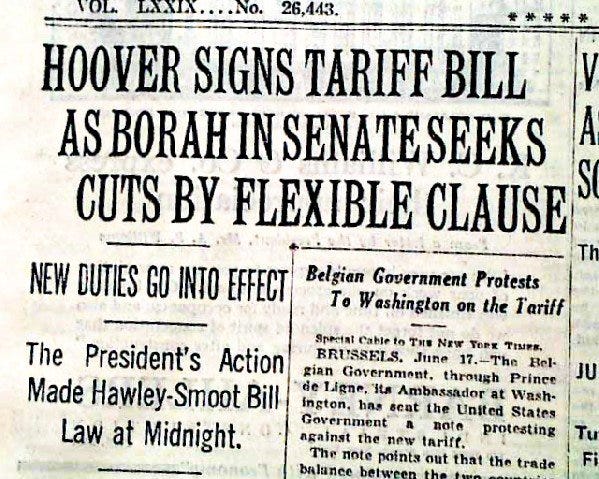Tariffs. They sound like a technical issue—something for economists, politicians, and corporate executives to debate. But here’s the truth: tariffs affect you more than you think.
They shape the prices of everything from your morning coffee to the car you drive. They influence inflation, job markets, and even economic downturns. And most of what people believe about tariffs? It’s oversimplified—or flat-out wrong.
Tariffs Aren’t Just About “Taxing Foreign Goods”
Most people think of tariffs as a simple tax on imports. The idea is that tariffs make foreign products more expensive, so consumers will naturally buy more domestic goods.
But here’s what really happens:
The U.S. places a tariff on foreign-made cars.
The foreign car company still wants to sell in the U.S., so they increase their prices to cover the tariff.
Now you’re paying more for that same car—whether it’s foreign or domestic—because domestic manufacturers also raise prices due to reduced competition.
This pattern repeats across industries—tech, clothing, food, appliances—driving up costs for everyday consumers.
“Tariffs Will Save American Jobs” Is a Half-Truth
One of the biggest selling points for tariffs is that they protect American workers. If foreign competition is more expensive, domestic companies will thrive, right?
Not so fast.
What actually happens:
✅ Some industries see a temporary boost.
❌ Other industries that rely on imported materials—like car manufacturers and electronics companies—face higher production costs and are forced to cut jobs.
❌ Countries affected by U.S. tariffs retaliate, imposing their own tariffs on U.S. exports, hurting American businesses trying to sell overseas.
But here’s the thing—tariffs don’t just impact one industry. They create ripple effects that touch everything from supply chains to local employment rates. It’s a classic case of short-term gain, long-term pain.
Tariffs Are Just a Fancy Word for a Price Hike
Tariffs might sound like a way to “punish” foreign manufacturers, but let’s be honest about who actually pays for them: you.
When a tariff is placed on imported goods, companies don’t just eat the cost—they pass it on to you, the consumer. That means:
Your smartphone? More expensive.
Your groceries? More expensive.
Your appliances, clothes, and gas? More expensive.
In short, tariffs are a hidden tax on consumers—but because they don’t show up as a direct charge, most people don’t even realize they’re paying them.
The Smoot-Hawley Tariff Act: A Lesson from History
Tariffs are nothing new. In fact, one of the worst economic disasters in U.S. history was made worse by tariffs.
In 1930, during the early days of the Great Depression, Congress passed the Smoot-Hawley Tariff Act—a law that raised tariffs on over 20,000 imported goods. The goal was to protect American farmers and businesses by making foreign goods more expensive.
But instead of helping the economy, it backfired spectacularly.
Other countries retaliated with their own tariffs, slashing U.S. exports by more than 60%.
Farmers, who relied on selling crops internationally, saw their businesses collapse.
Global trade slowed down dramatically, deepening the Great Depression.
The lesson? Tariffs might seem like an easy fix, but history has shown they often cause more harm than good.
The Myth of Self-Sufficiency
Another argument for tariffs is that they make the country more self-sufficient—encouraging domestic production instead of relying on imports.
But here’s the thing—no economy is truly self-sufficient.
The U.S. relies on imported raw materials like aluminum, lithium (for batteries), and semiconductors.
Many American companies depend on global supply chains to stay competitive.
Cutting off international trade doesn’t make the economy stronger—it makes products more expensive and industries less efficient.
Self-sufficiency sounds great in theory, but in reality, it often means higher prices, lower quality, and fewer choices for consumers.
Tariffs and Inflation: The Hidden Connection
Tariffs don’t just affect individual products—they can fuel inflation across the entire economy.
When companies face higher import costs, they raise prices on everything, including:
Everyday goods like food and clothingManufacturing materials like steel and plastic
Services that rely on imported technology
Once prices go up, it’s hard to bring them back down—meaning tariffs can drive long-term inflation.
The Real Winners of Tariffs? Not You.
So if tariffs make goods more expensive, disrupt supply chains, and hurt economic growth, why do governments keep imposing them?
Because some groups do benefit:
🔹 The government – Tariffs generate billions in revenue.
🔹 Certain industries – Companies shielded from competition benefit in the short term.
🔹 Lobbyists and special interest groups – Many tariffs are pushed by industries that want protection, even if it hurts the broader economy.
But for regular consumers? Tariffs mean higher prices, fewer choices, and weaker purchasing power.
How the Average American Can Prepare for Tariffs
You can’t control government policies, but you can make smart financial moves to soften the impact of tariffs. Here’s how:
Buy American (Strategically): Not all U.S.-made goods are cheaper, but some are. Compare domestic vs. imported prices to see where you can save.
Stock Up on Essentials: If a tariff is announced on products you frequently buy (like food, electronics, or clothing), consider stocking up before prices rise.
Adjust Your Budget: If tariffs cause inflation, it may be time to review your expenses and cut back on non-essentials.
Look for Generic Alternatives: Store-brand products or lesser-known manufacturers may not be hit as hard by tariffs.
Stay Informed: Keep an eye on which industries are affected so you can plan purchases accordingly.
The Bottom Line: You Can’t Ignore Tariffs
Most people don’t follow trade policies or pay attention to tariff negotiations. But that doesn’t mean tariffs don’t affect them.
Every time you shop, every time you buy gas, every time you make a major purchase—you’re feeling the impact of tariffs.
And the next time you hear a politician promise that tariffs will “fix” the economy, ask yourself: Fix for whom?
Because if history is any guide, it won’t be for you.
Have a great week,
Jordan





